
The 6th Day is a 2000 American science fiction action film directed by Roger Spottiswoode and starring Arnold Schwarzenegger, Tony Goldwyn, Michael Rapaport, Michael Rooker, Sarah Wynter, and Robert Duvall. In the film, a family man of the future is illegally cloned by accident as part of a vast conspiracy involving a shady billionaire businessman, and is thrust into a struggle to clear his name and protect his family from the conspirators who seek to keep the cloning a secret. The title refers to the Genesis creation narrative shared among the Abrahamic religions, where God created humanity on the sixth day of the universe's existence. The film was Terry Crews' acting first appearance.
Colin Campbell was a Canadian video artist.
Jubal Brown is a video producer and multi-media artist based in Toronto, Ontario, Canada. He gained notoriety in 1996 when he deliberately vomited primary colours on paintings in the Art Gallery of Ontario in Toronto, and the Museum of Modern Art in New York.
A virtual human, virtual persona, or digital clone is the creation or re-creation of a human being in image and voice using computer-generated imagery and sound, that is often indistinguishable from the real actor.

Frank's Cock is a 1993 Canadian short film written and directed by Mike Hoolboom. The eight-minute production stars Callum Keith Rennie as an unnamed narrator who discusses his relationship with his partner, Frank. The two met while the narrator was a teenager and spent nearly ten years together. Frank has since been diagnosed with AIDS, and the narrator fears his death. The story was based on the experience of one of Hoolboom's friends at People With AIDS, which Hoolboom adapted after receiving a commission to create a short film about breaking up.
Rehab Nazzal is a Palestinian-born multidisciplinary artist based in Toronto, Ontario, Canada.
Steve Reinke is a Canadian video artist and filmmaker.
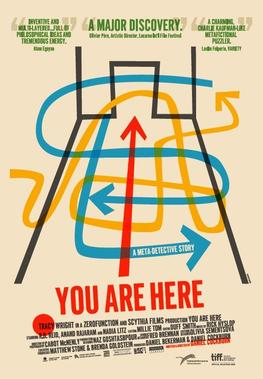
You Are Here is a 2010 Canadian philosophical speculative fiction film written and directed by video artist Daniel Cockburn, which he also co-produced with Daniel Bekerman. Cockburn's first feature film is "hyper-inventive and categorically hard-to-describe", initially billed as a "Borgesian fantasy" or a "meta-detective story", and later as "part experimental gallery film and part philosophical sketch comedy." In You Are Here, Cockburn makes use of the techniques and concepts he had honed over the previous decade as an experimental video artist with "a narrative bent", and "works them into a complex and unique cinematic structure." The film mainly follows a woman searching for the meaning behind a series of audiovisual documents from other universes, seemingly left purposefully for her to find, some of which are shown as vignettes concerning figures such as the Lecturer and the Experimenter interspersed throughout the film. She finds so many of them that they fill a space which she calls the Archive, and herself its Archivist. In time, the Archive appears to resist her attempts at cataloguing and organizing it, and she receives a cell phone instead of the usual document, leading to a fateful encounter with others.
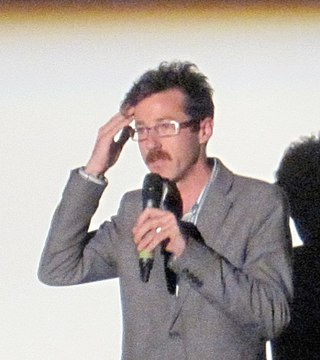
Daniel Ernest Cockburn is a Canadian performance artist, film director and video artist. Cockburn won the Jay Scott Prize in 2010 and the European Media Art Festival's principal award in 2011 for his debut feature film You Are Here.
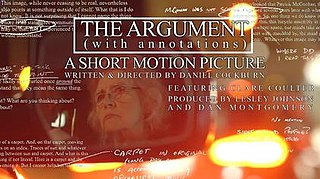
The Argument (With Annotations) is a 2017 Canadian-British short experimental drama film written, directed, and edited by video artist Daniel Cockburn. The short's first half attempts to deceive the audience into thinking it is a non-fictional video essay, revealing itself mid-way to be a work of fiction, the essay actually the work of the film's protagonist, an elderly professor (Clare Coulter). Submitted as Cockburn's thesis for the degree of Master of Fine Arts in Film studies at York University, the film had its world premiere at the 42nd Toronto International Film Festival, and has been warmly received by critics.

God's Nightmares is a 2019 Canadian-British short experimental black comedy film created by Daniel Cockburn that "mashes together" appropriated film clips, creating a visual collage that imagines the thoughts that plague God at night, his "interior monologue," in which he muses about a recurring nightmare of being an everyman.

Metronome is a 2002 Canadian short experimental film which mixes appropriated film clips and video by video artist Daniel Cockburn to express ideas about rhythm and order, the self and other minds, and the digital age. Densely philosophical, the work is acknowledged as his international "breakout hit" after several locally successful short works, winning praise from critics, a mention, and an award.
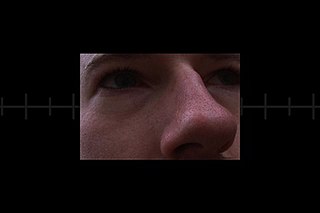
Nocturnal Doubling is a 2004 Canadian short experimental film by video artist Daniel Cockburn based on a thought experiment in Henri Poincaré's essay The Relativity of Space.
The Impostor (hello goodbye) is a 2003 Canadian short experimental film by video artist Daniel Cockburn, one of several works commissioned for The Colin Campbell Sessions and inspired by the makings of video art pioneer Colin Campbell for the Tranz Tech festival. Cockburn's video draws formally on Campbell's style while at the same time metaphorically expresses the artist's anxiety in making the video itself.
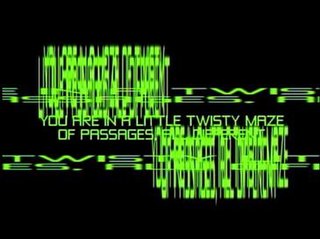
You Are In a Maze of Twisty Little Passages, All Different: Films and Videos by Daniel Cockburn is a 2009 Canadian experimental film anthology consisting of a curated programme of eleven short films by video artist Daniel Cockburn.

The Other Shoe is a 2001 Canadian short experimental film by video artist Daniel Cockburn, his third, which, along with Metronome (2002), earned a mention for the Homebrew Award when shown at the Images Festival and thereby broadened his reputation beyond Toronto.
Denominations is a 2003 Canadian short experimental documentary film created by video artist Daniel Cockburn about some time spent with American video artist Joe Gibbons.
Stupid Coalescing Becomers is a 2004 Canadian short darkly comic experimental film by video artist Daniel Cockburn about time running backwards as an act of rebellion.

Louise Liliefeldt is a Canadian artist primarily working in performance and painting. She was born in South Africa and currently lives and works in Toronto, Canada. Liliefeldt’s artistic practice draws directly from her lived experience and is apparent in the use of symbol, colour and material in her work. Other influences include Italian, Latin and Eastern European horror films, surrealism and African cinema. Taken as a whole, Liliefeldt’s work is an embodied investigation of the culture and politics of identity, as influenced by collective issues such as gender, race and class. Her performance work has developed through many prolific and specific periods.
Aleesa Cohene is a Canadian visual artist based in Los Angeles.
![.mw-parser-output .quotebox{background-color:#F9F9F9;border:1px solid #aaa;box-sizing:border-box;padding:10px;font-size:88%;max-width:100%}.mw-parser-output .quotebox.floatleft{margin:.5em 1.4em .8em 0}.mw-parser-output .quotebox.floatright{margin:.5em 0 .8em 1.4em}.mw-parser-output .quotebox.centered{overflow:hidden;position:relative;margin:.5em auto .8em auto}.mw-parser-output .quotebox.floatleft span,.mw-parser-output .quotebox.floatright span{font-style:inherit}.mw-parser-output .quotebox>blockquote{margin:0;padding:0;border-left:0;font-family:inherit;font-size:inherit}.mw-parser-output .quotebox-title{text-align:center;font-size:110%;font-weight:bold}.mw-parser-output .quotebox-quote>:first-child{margin-top:0}.mw-parser-output .quotebox-quote:last-child>:last-child{margin-bottom:0}.mw-parser-output .quotebox-quote.quoted:before{font-family:"Times New Roman",serif;font-weight:bold;font-size:large;color:gray;content:" " ";vertical-align:-45%;line-height:0}.mw-parser-output .quotebox-quote.quoted:after{font-family:"Times New Roman",serif;font-weight:bold;font-size:large;color:gray;content:" " ";line-height:0}.mw-parser-output .quotebox .left-aligned{text-align:left}.mw-parser-output .quotebox .right-aligned{text-align:right}.mw-parser-output .quotebox .center-aligned{text-align:center}.mw-parser-output .quotebox .quote-title,.mw-parser-output .quotebox .quotebox-quote{display:block}.mw-parser-output .quotebox cite{display:block;font-style:normal}@media screen and (max-width:640px){.mw-parser-output .quotebox{width:100%!important;margin:0 0 .8em!important;float:none!important}}
[Schwarzenegger]: What are you doing to me? I don't think this is very funny. Who are you? You think you are a media artist because you control me with a piece of software. This is terrible. This is not natural. This is creepy. You know that. I want my life back. You think you are God because you control me. No, I don't think you are God. I don't think you are a media artist. You are a sick bastard. You can go fuck yourself. I'm going to take my life back.
[Videomaker]: Love me two times Frankenstein and I'll enjoy you from both ends, making and unmaking you. I prefer your image anyways, the one that's on my hard drive, cooking all night with new changes. Wait until you see the new you. Though looking forward is something only I can do. You are condemned to looking back.
----WEAKEND still frame and dialogue WEAKENDstill.jpg](http://upload.wikimedia.org/wikipedia/en/thumb/5/5a/WEAKENDstill.jpg/300px-WEAKENDstill.jpg)












